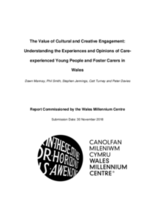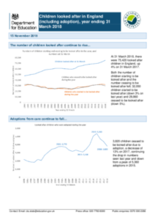Displaying 701 - 710 of 1177
This research aimed to assess the current knowledge base regarding careexperienced children’s and young people’s engagement with the arts, and to explore the views of facilitators, young people, and their carers involved in the arts-based programme at the Wales Millennium Centre.
This thesis aimed to systematically review literature on the types, measurement and effectiveness of residential staff training, focussed upon psychosocial outcomes.
This study provides an analysis of the ‘investigative turn’ in England by comparing two large cohorts of children, one whose fifth birthday was in 2011–12 and the other in 2016–17.
In this video from the BBC, Lemn Sissay (writer and careleaver) tells BBC Radio 5 Live about the impact that growing up in care has had on his adult life.
Lemn Sissay, a poet and playwright who grew up in care in the UK, hosts a documentary in which he "takes seven children who are in the charge of Coventry Council under his wing, firing them up to write about their experiences."
In this documentary episode from Channel 4 in the UK, Lemn Sissay meets seven young people who are in the care of their council and sets out to help them express their experiences through words and perform them to a packed theatre of decision-makers.
This paper investigates how ‘care leaver’ is discursively constructed as a group identity, by analyzing 18 written personal experience stories from several charity websites by people identified or who self-identify as care leavers.
This statistics publication from the UK Department for Education provides information about looked after children in England for the year ending 31 March 2018.
This article from BBC News highlights some of the findings from a survey commissioned by the Welsh Government as part of the Bright Spots Programme to help local authorities understand what matters most to the children they look after.
Who Cares? Scotland and other advocates are calling for standardised guidance to support care leavers, allowing better access to care records, according to this article from the National.


